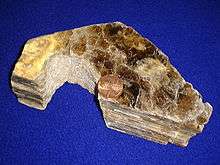Definify.com
Webster 1913 Edition
Mica
Mi′ca
,Noun.
[L.
mica
crumb, grain, particle; cf. F. mica
.] (Min.)
The name of a group of minerals characterized by highly perfect cleavage, so that they readily separate into very thin leaves, more or less elastic. They differ widely in composition, and vary in color from pale brown or yellow to green or black. The transparent forms are used in lanterns, the doors of stoves, etc., being popularly called
isinglass
. Formerly called also cat-silver
, and glimmer
. ☞ The important species of the mica group are:
muscovite
, common or potash mica, pale brown or green, often silvery, including damourite
(also called hydromica
and muscovy glass
); biotite
, iron-magnesia mica, dark brown, green, or black; lepidomelane
, iron, mica, black; phlogopite
, magnesia mica, colorless, yellow, brown; lepidolite
, lithia mica, rose-red, lilac.Mica
(usually muscovite, also biotite) is an essential constituent of granite, gneiss, and mica slate; biotite
is common in many eruptive rocks; phlogopite
in crystalline limestone and serpentine.Mica diorite
(Min.)
, an eruptive rock allied to diorite but containing mica (biotite) instead of hornblende.
– Mica powder
, a kind of dynamite containing fine scales of mica.
– Mica schist
,
Mica slate
(Geol.)
, a schistose rock, consisting of mica and quartz with, usually, some feldspar.
Webster 1828 Edition
Mica
MI'CA
,Noun.
Jameson subdivides mica into ten subspecies, viz. mica, pinite, lepidolite,chlorite, green earth, talck, nacrite, potstone, steatite and figure stone.
Definition 2026
mica
mica
See also: mică
English

A sheet of mica
Noun
mica (countable and uncountable, plural micas)
- (mineralogy) Any of a group of hydrous aluminosilicate minerals characterized by highly perfect cleavage, so that they readily separate into very thin leaves, more or less elastic.
Translations
hydrous aluminosilicate minerals
|
See also
Anagrams
Catalan
Etymology
Pronunciation
- (Eastern) IPA(key): /ˈmikə/
- (Western) IPA(key): /ˈmika/
Noun
mica f (plural miques)
- a bit, a small piece
Derived terms
Italian
Etymology
Noun
mica f (plural miche)
- mica
- Any of a group of hydrous aluminosilicate minerals characterized by highly perfect cleavage, so that they readily separate into very thin leaves, more or less elastic
Adverb
mica
- (colloquial) not
- Mica male! - Not bad!
- (colloquial) hardly, you know
- Mica sono stupido - I’m hardly stupid; I’m not stupid, you know
- (colloquial) bit
- Non è mica cambiato - It hasn't changed one bit
- (colloquial) at all
- Non costa mica molto - It is not at all expensive
- (colloquial) by any chance
- Non hai mica trovato il mio portafoglio? - Have you seen my wallet by any chance?
Anagrams
Latin
Etymology
From Latin *smīkā, from Proto-Indo-European *smeyg- (“small, thin, delicate”), related to Old English smicor (“beauteous, beautiful, elegant, fair, fine, tasteful”). More at smicker.
Pronunciation
- (Classical) IPA(key): /ˈmiː.ka/
Noun
mīca f (genitive mīcae); first declension
Inflection
First declension.
| Case | Singular | Plural |
|---|---|---|
| nominative | mīca | mīcae |
| genitive | mīcae | mīcārum |
| dative | mīcae | mīcīs |
| accusative | mīcam | mīcās |
| ablative | mīcā | mīcīs |
| vocative | mīca | mīcae |
Descendants
References
- mica in Charlton T. Lewis and Charles Short (1879) A Latin Dictionary, Oxford: Clarendon Press
- mica in Charlton T. Lewis (1891) An Elementary Latin Dictionary, New York: Harper & Brothers
- MICA in Charles du Fresne du Cange’s Glossarium Mediæ et Infimæ Latinitatis (augmented edition, 1883–1887)
- Félix Gaffiot (1934), “mica”, in Dictionnaire Illustré Latin-Français, Paris: Hachette.
Portuguese
Noun
mica f (plural micas)
- mica (hydrous aluminosilicate mineral)
Related terms
Verb
mica
- third-person singular (ele and ela, also used with você and others) present indicative of micar
- second-person singular (tu, sometimes used with você) affirmative imperative of micar